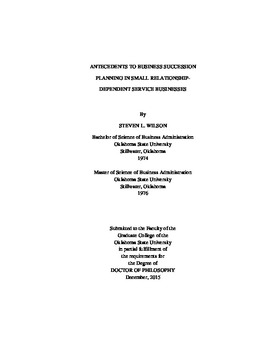| dc.contributor.advisor | White, Margaret A. | |
| dc.contributor.author | Wilson, Steven L. | |
| dc.date.accessioned | 2016-09-29T18:46:57Z | |
| dc.date.available | 2016-09-29T18:46:57Z | |
| dc.date.issued | 2015-12 | |
| dc.identifier.uri | https://hdl.handle.net/11244/45386 | |
| dc.description.abstract | As the baby boom generation approaches and enters traditional retirement ages, the owners of small professional service firms are being inundated with advice concerning how to implement a business succession plan. While much of the advice may be valuable and sound, a significant portion of this advice appears to be derived from a one-size-fits-all approach that ignores, or fails to address, the needs, desires, and personal characteristics of the business owner. Small business succession planning advice often involves growing the business into a self-perpetuating organism. However, many small business owners may not want to do what is necessary to manage a business for optimum succession planning. The researcher used a quantitative research methodology to identify antecedents to business succession planning in small, relationship-dependent service businesses. The research combines concepts from the Theory of Planned Behavior and from the family business succession planning literature to identify potential owner characteristic and situational antecedents to business succession planning. The study focused on a sample population of owners of small financial-services businesses affiliated with one broker-dealer. Most of the sample population offers tax and accounting services in addition to their financial services. The population is in the business of planning for their customers but to a large extent neglect or choose not to plan for their own ultimate exit from the business. While business owners face many choices and obstacles in preparing their firms for their eventual exit, this study indicates that the decision to pursue business succession planning by the owners of small, relationship-dependent service businesses is overwhelmingly driven by the business owners' perception of the availability of a qualified successor. Thus the decision to pursue business succession planning by this sample population is more likely to be a reaction to circumstances than a proactive choice driving the owners' business decisions. | |
| dc.format | application/pdf | |
| dc.language | en_US | |
| dc.rights | Copyright is held by the author who has granted the Oklahoma State University Library the non-exclusive right to share this material in its institutional repository. Contact Digital Library Services at lib-dls@okstate.edu or 405-744-9161 for the permission policy on the use, reproduction or distribution of this material. | |
| dc.title | Antecedents to business succession planning in small relationship-dependent service businesses | |
| dc.contributor.committeeMember | Trennepohl, Gary L. | |
| dc.contributor.committeeMember | Edwards, Bryan D. | |
| dc.contributor.committeeMember | Hill, Aaron D. | |
| osu.filename | Wilson_okstate_0664D_14340.pdf | |
| osu.accesstype | Open Access | |
| dc.type.genre | Dissertation | |
| dc.type.material | Text | |
| thesis.degree.discipline | Business Administration | |
| thesis.degree.grantor | Oklahoma State University | |
